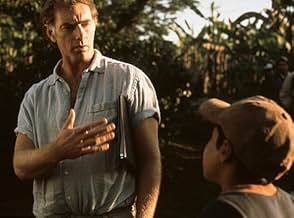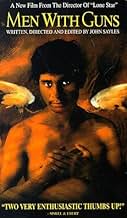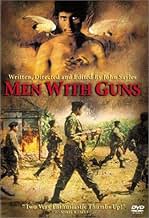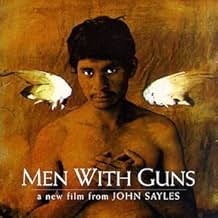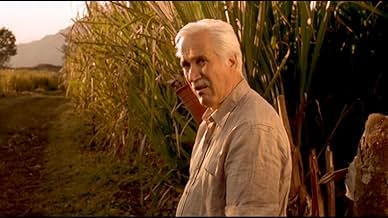Men with Guns
- 1997
- Tous publics
- 2h 7min
Humberto Fuentes est un riche médecin dont la femme est décédée récemment. Malgré les conseils de ses enfants, il part en voyage pour rendre visite à ses anciens élèves qui travaillent désor... Tout lireHumberto Fuentes est un riche médecin dont la femme est décédée récemment. Malgré les conseils de ses enfants, il part en voyage pour rendre visite à ses anciens élèves qui travaillent désormais dans des villages défavorisés.Humberto Fuentes est un riche médecin dont la femme est décédée récemment. Malgré les conseils de ses enfants, il part en voyage pour rendre visite à ses anciens élèves qui travaillent désormais dans des villages défavorisés.
- Réalisation
- Scénario
- Casting principal
- Récompenses
- 4 victoires et 4 nominations au total
- Rich Lady
- (as Jacqueline Walters Voltaire)
Avis à la une
Naively unconvinced that there is any danger from a guerilla war in the interior, Dr. Fuentes travels to remote areas to discover his "legacy". Soon he finds out the reality. His tires are removed, his wallet is stolen, his life is threatened, and he cannot get any information because people won't speak to him out of fear. He sees starving people, destroyed villages, and people who have lost their hope, while the world is ignorant of what is taking place. Dr. Fuentes picks up several travelling companions along the way; and learns more about the struggles they have endured. Each has lost something close to them. Domingo (Damian Delgado), a soldier has deserted his army, Conejo (Dan Rivera Gonzales), a very wise young boy has lost his parents, an ex-priest Padre Portillo (Damian Alcazar) has lost his faith, and a native woman has lost her voice after being raped by soldiers.
At the first village, a blind woman tells Dr. Fuentes that the "men killed one of his students with guns". When he asks her the reason, she says simply, "Because they had guns and we didn't". The film clearly shows the powerlessness of the Indians and peasants caught in the middle of a conflict they do not want to be involved in. Sayles shows peasants as little more than commodities who are used by the system: the Salt people, the Sugar people, the Coffee, Banana and Gum people, all surviving at subsistence level because of economic conditions beyond their control. The doctor finds out that it does not matter who is threatening the people, they are all just "men with guns" and Indians are just as capable of cruelty against their own people as government soldiers. Fuentes discovers that some of his students have been killed but keeps going from village to village to look for the rest. His expectations, however, are met only with one grim story after another. Weary but not despairing, he and his traveling companions set out on one last journey, a spiritual quest to find a city hidden in the rainforest called Circle of Heaven where the air is clear and there are no guns.
Men With Guns has a point to make but makes it early and often and there is little suspense or plot development in the last half of the film. Mr. Sayles has wisely kept the story as generic as possible but there is no indication of what the issues are or what the conflict is all about. It is well known that civilians and "innocent bystanders" are often the biggest victims in war. Beyond that, what is the film saying? Is it that resistance movements who might be fighting an uphill battle against a brutal dictator should lay down their arms? Aside from the problems I had with the issues, the characters come across as types rather than real people. Oblivious American tourists, played by Mandy Patinkin and Kathryn Grody, are too laughable to even warrant being called stereotypes. Though credit must be given for tackling a subject that most filmmakers would rather not hear about, Men With Guns is overlong and lacking in dramatic impact. Eventually, it veers off into magical realism with much self-consciousness but little realism and no magic.
Although he's long marched to beat of a different drummer, as they say, as one of the few truly independent American filmmakers, Sayles really goes out on the edge this time, giving us a film which is presented almost entirely in Spanish, with English subtitles, as he tells the tale of a doctor in an unnamed Latin American country who undertakes a journey into the rain forest in search of a group of young medical students he'd trained some years before. Not only does he expect us to put up with the subtitles, but he also fills the movie with a largely unknown cast (to most American audiences, that is), of Latin American actors and actresses.
Federico Luppi, the film's star, is an older actor and one I'm not familiar with. He has the air about him of a quiet, dignified man. A city-dweller, through and through, he has always bought into the government's version of the battle between mountain guerrillas and government troops. He's had no reason to doubt the stories nor to suspect otherwise.
Ultimately, though, as the title suggests, this is not a story about winners and losers, about the "official story," but about the effects on the daily lives of the country's people that "men with guns" can have. Whether they are soldiers or guerrillas, bandits or thieves, on the side of the good or the bad, they are simply "men with guns" and the people do what they say because of this simple fact.
The film's journey, started largely out of boredom (the doctor is nearly retired and looking for something to do with his time) gradually becomes a mythical, almost allegorical journey, as he moves from village to village, unsuccessful in his search. It begins to appear that most (all?) of his former students have been killed or otherwise incapacitated, viewed by the rebels or the villagers they went to serve as a danger.
Along the way, the doctor gradually picks up a group of traveling companions, including an army deserter, a former priest, a little boy, and a woman who has not spoken since she was raped by soldiers. The deserter and the priest tell their very poignant stories and the doctor is forced to gradually open his eyes to the realities of the world around him.
As they continue, ever deeper into the jungle, the story, which was never grounded in a specific reality anyway, becomes even more dreamlike and unreal, as the travelers seek out the mythical "Circle of Heaven," a village so high on a mountain and so deep in the forest that soldiers cannot find it and the people there live in freedom. This is a movie that truly verges into the area of magical realism which so many Latin authors provide in their novels, but which is seldom seen successfully on the screen.
If one is able to put up with the subtitles (there are moments when a couple of American tourists, one played by Mandy Patinkin, burst onto the screen, with their loud English and "ugly American" attitudes), the film is a real treat.
John Sayles has sometimes been criticized as a filmmaker for being more interested in telling his story than in fiddling with the camera angles and photography. If that's a valid criticism, I fear for the future of American film. In both _Lone Star_ and this film, Sayles shows us the value of a well-told story in a film, a virtue which increasingly seems to be disappearing, in favor of explosions and special effects. Very highly recommended. Rating: A.
Le saviez-vous
- AnecdotesJohn Sayles wrote his first draft in Spanish, the second in English and then polished it back into Spanish for his third draft.
- Citations
Dr. Fuentes: You know, you can never save a life. You can make it longer or better, but you can't save it. In the end, everyone dies.
Meilleurs choix
- How long is Men with Guns?Alimenté par Alexa
Détails
- Date de sortie
- Pays d’origine
- Langues
- Aussi connu sous le nom de
- Hombres armados
- Lieux de tournage
- Sociétés de production
- Voir plus de crédits d'entreprise sur IMDbPro
Box-office
- Budget
- 2 500 000 $US (estimé)
- Montant brut aux États-Unis et au Canada
- 910 773 $US
- Montant brut mondial
- 910 773 $US
- Durée2 heures 7 minutes
- Couleur
- Mixage
Contribuer à cette page


